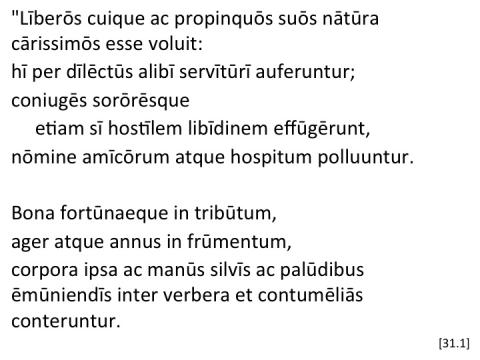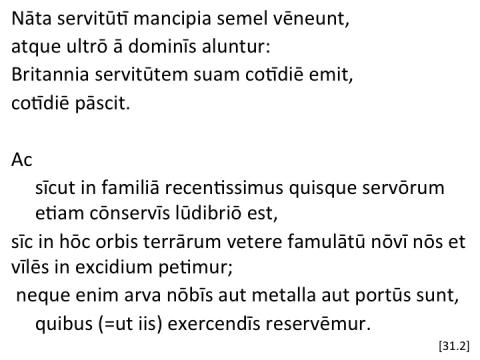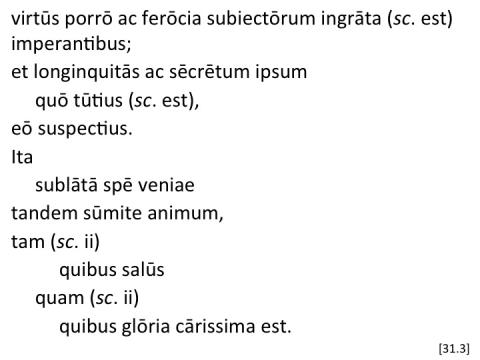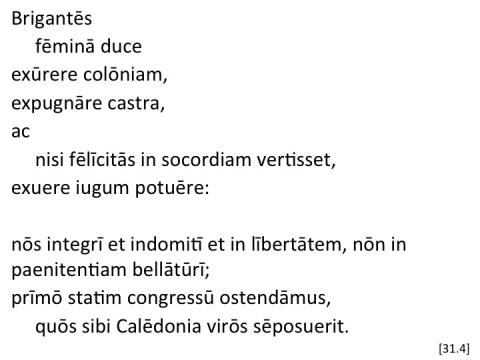Overview: “Our persons and our property are the spoils of our conquerors; we are slaves who buy the privilege of serving and supporting masters who are indifferent to our existence; courage, ye Scots! what the Brigantes so nearly accomplished, we can do." (Stuart); this chapter begins on f. 60v of the codex Aesinas.
31.1
voluit = decrevit. So often; with natura personified. (Gudeman)
alibī: “somewhere or other,” not “elsewhere,” for Calgacus cannot have meant to exclude the British auxiliaries in Britain itself. British cohorts are found e.g. in the armies of Caecina and Vitellius, at the second battle of Bedriacum, in Pannonia, and elsewhere, as we learn from Tacitus's Histories and inscriptions. (Gudeman) alibī servītūrī: see note on chapter 29.2. Calgacus has in mind the usual procedure of the Romans, hence makes no exception of the fact that trusted Britons were serving with Agricola. British recruits are on record as having served in Algeria, Pannonia, Dacia, and Italy. (Stuart)
hostīlem = hostium. Tacitus often substitutes this and other adjectives for the genitive. Subjective as here, e.g. ... . (Gudeman) [A&G 343, note 1]
nōmine amīcōrum: “by persons professing to be friends.” The phrase is loosely kept from the active construction which Tacitus had in mind: “The Romans dishonour them under the name of friends.” He actually says, “they are dishonoured under the name of friends,” leaving the precise meaning to be made out by the intelligence of the reader. (Pearce) nōmine amīcōrum atque hospitum: the thought is slightly obscured by overconciseness, the implication being that the victims were by the false professions of friendship and hospitality first thrown off their guard and then dishonored. (Gudeman)
ager atque annus: “their yearly harvest.” Ager is here added for the sake of balancing the five other groups of virtually synonymous expressions in this one sentence. (Gudeman) annus: in the sense of annona, "the annual yield of the fields." (Stuart)
in frūmentum: “to pay the corn requisition,” not "tithe corn"—the Britons paid a money tax (tributum) instead—but the corn requisitioned for the use of the general and his troops. With in frumentum, as well as in tributum, a word like consumuntur must be supplied from conteruntur. (Pearce)
silvīs ... ēmūniendīs: “in making roads through woods.” It is a variant from the ordinary construction viis per silvas muniendis. Roads to allow the rapid movement of troops and colonies of veterans to act as garrisons were the steps always taken by the Romans to secure a conquered country. (Pearce) ēmūniendīs: “in the clearing.” (Gudeman)
atque … ac … ac … ac: such accumulations of ac are extremely rare in Latin. (Gudeman)
inter: i.e. "alternating between." So similarly, ch. 32.3. (Gudeman); “midst;” descriptive of external conditions. (Stuart) inter verbera ac contumēliās: contumelia has here the concrete and restricted meaning of “cuffs in the face,” as distinguished from the generic term verbera, “blows.” On the combination, see Introd. p. xxx, #17. (Gudeman)
conteruntur: means both “expended” and “worn out,” hence may be appropriately joined to all three nominative couplets. (Stuart); used ... figuratively with bona fortunaeque and ager atque annus, in its usual sense with corpora … manus. See note on Introd. p. xxxii, #8. It is, therefore, not necessary to supply consumuntur by zeugma. (Gudeman)
31.2
nāta servitūtī: a bold use of the dative of “aim.” (Pearce); like honori in 3.3, servituti can be construed as a dative of purpose. (Fox) [A&G 382]
semel: contrasted with quotidie. (Pearce)
ultrō: “to boot.” (Stuart); “besides.” (Pearce); “moreover, in the bargain.” (Gudeman)
Britannia: on the ellipsis of sed, see Introd. p. xxxi, #5. (Gudeman)
emit … pāscit: refer respectively to tributum and frumentum. Calgacus says with bitter sarcasm that the Britons are daily paying for the privilege of being Roman slaves, instead of having their masters, if servitude it must be, care for them. (Gudeman) pāscit: by supplying the Romans with grain. (Stuart) emit contrasted with veneunt is explained by tributum above, pāscit contrasted with aluntur by frumentum. (Pearce)
familiā: “a household establishment.” (Stuart) sīcut in familiā: somewhat inconsistently with true portraiture of character, the speaker is made to allude to purely Roman conditions, of which he could not have had any knowledge. But such inaccuracies are frequent in the speeches of ancient historians. Observe also that this simile makes Calgacus forget the statements made in ch. 30.1. On the brachylogical character of the simile, see Introd. p. xxxiii, #10. (Gudeman)
etiam cōnservīs: to say nothing of their masters. (Stuart)
sīc … petimur: Calgacus does not follow out his simile quite consistently. There would be no parallel to the mockery by the fellow-slaves in the case of the Roman subjects. Viles serves as the nearest suitable equivalent, and this leads to the further deviation in the bitter reflection that they were not even worth keeping alive. (Pearce) vīlēs: their worthlessness is explained by the following sentence. (Stuart) in excidium petimur: the comparison is heightened unexpectedly. The Britons have not simply to fear the mockery visited upon new members of the slave household, but they are regarded as so worthless that their owners would rather kill than support them. (Stuart)
neque enim: explains viles. (Pearce)
arva nōbīs aut metalla: Calgacus is speaking of Caledonia, not of Britain as a whole.(Pearce)
quibus exercendīs: exercere can be used with arva and metalla in the sense of ”to work,” but hardly, except by zeugma, with portus in the sense of “to construct.” (Pearce) exercendīs: “to engage upon.” This clause gives the reasons for viles. "We are not a paying investment to the Romans," says the speaker, "for we have no arable land, no mines, no harbors, upon which we can be put to work." In this sense, with inanimate objects, exercere is poetic and post-Augustan, but comparatively rare. (Gudeman)
31.3
porrō: introduces another reason why their extirpation was sought. (Pearce)
ferōcia: do not use the English derivative. (Stuart)
longinquitās ... tūtius: sc. est. (Damon); a restatement, in different form, of ch. 30.3. (Gudeman)
suspectius: “the more dangerous.” Their distance and seclusion made them more formidable, as the Romans had no means to determine the real strength and the purposes of the Britons and omne ignotum pro magnifico (ch. 30.3). (Gudeman)
quibus ... quibus: the effect of the appeal is heightened by the anaphora. (Stuart)
sūmite animum: “muster up your courage.” (Gudeman)
31.4
Brigantēs: the tribes which took part in Boudicca's uprising were the Iceni and Trinobantes; but the error is probably purposely made by Calgacus (or Tacitus), as the Brigantes were the immediate neighbours of the Caledonians, and their example would be likely to have a more stimulating effect. (Pearce); Petilius won some moderate successes against them, see note ch. 8.2. They are not mentioned elsewhere in connection with the uprising under Boudicca, but Calgacus is here made to refer to them, because they were the most powerful and most numerous tribal confederacy in Britain and, as the nearest neighbors of the Caledonians, better known to the latter than Boudicca's followers. (Gudeman)
colōniam: i.e. Camulodunum. (Gudeman)
in socordiam vertisset: on vertere as a middle, see ch. 18.1. (Gudeman)
potuēre: governs the three infinitives. With the last there is an ellipsis of an apodosis et exuissent: “They were able to throw off the yoke and would have done so if …”. (Stuart); expresses a fact. They were able to, and actually did, burn the colony and storm the camp. They were able to, but did not, shake off the Roman yoke. That they did not carry their ability into action in the latter case is shown by the clause of “unfulfilled condition,” nisi ... vertisset. In this latter case we turn by “could have” to express unrealized power. Notice vertisset intransitive. (Pearce) [A&G 511]; posse, and so similarly, debere, oportet, opus est, and the gerundive, are very often in the indicative in the “contrary to fact” conditional clauses, for their inherent meaning is, strictly speaking, incompatible with irreality. (Gudeman) [A&G 500, 517c]
et … et: on the force of the polysyndeton, see Introd. p. xxvii, #10. (Gudeman)
in lībertātem, etc.: “to secure our freedom, not (like the Brigantes) to have to regret our failure.” (Pearce)
bellātūrī: an emendation for the manuscript's laturi, which needs an object (see line 4 of the right-hand column). Other repairs are possible, including the addition of arma (see note below). (Damon) non in paenitentiam arma lātūrī: “soon to close in conflict ... not with the thought of a (future) change of heart.” They were so to acquit themselves that they would have no reason to regret their action. (Stuart)
prīmō statim: see note on ch. 3.1. (Gudeman)




